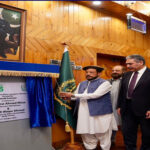[author image=”http://hunzanews.com/wp-content/uploads/2016/01/02.jpg” ]Ahmed Saeed Khan is a business consultant and aspiring filmmaker.[/author]
Hailing from one of the world’s biggest metropolitan cities, I have always been fascinated by the rural lifestyle and topographical features of Pakistan’s northern areas.
The strong cultural values and the connection that the natives feel with their history is something we lack in the cities. So struck I was by this phenomenon that I decided to make a journey to the valley of paradise, Hunza.
Altit Fort was on top of my to-see list, I had been told it would be the best place to learn about the origins of its people. While staying at a hotel in Hunza I met Kassim, a local guide who turned out to be a great help in my quest.
 The exterior view of the Altit Fort.
The exterior view of the Altit Fort.The valley’s inhabitants are the Burusho — they claim to be the descendants of Greek soldiers who were part of Alexander the Great’s army. The same is also commonly accepted about the Pakhtuns of Pakistan and Afghanistan.
The people of the ancient city of Altit are said to be the descendants of the progressive agricultural Turkic tribe of Huns from the Persian Empire, A.D 47. It is believed that the first name of the city was Hunukushal, meaning the village of Huns. Considering their mixed ancestry, it is no wonder that the locals have such striking features.
 View of the Hunza Valley from the fort. Apricots have been left on the roofs to dry — a traditional method of preserving the fruit for various uses.
View of the Hunza Valley from the fort. Apricots have been left on the roofs to dry — a traditional method of preserving the fruit for various uses.The great Altit Fort was built by the Mirs (ruling family) of Hunza as a display of power to the Mirs of Nagar (twin state) and has stood tall in front of Karakoram since the 11th century.
Not only has it survived many attacks from aggressors but also withstood several earthquakes since it was built, perhaps making it one of the most astonishing architectural structures of its time.
 Interior of the great fort. These doors were purposefully built to be only five feet in length so that if the enemy was able to breach security, they would have to bend down to enter the fort hence making it easier for the guards to decapitate them.
Interior of the great fort. These doors were purposefully built to be only five feet in length so that if the enemy was able to breach security, they would have to bend down to enter the fort hence making it easier for the guards to decapitate them.Looking at this mammoth structure, constructed on top of a high cliff, I was struck with awe at the kind of effort and architectural genius that went into completing it. Keeping in mind the technology of the time, it is unthinkable that a task like this was even conceivable in the 11th century.
A testimony of advanced engineering, the walled fort is the strongest structure of its time and is considered to be the birthplace and capital of Hunza city.
The unique structure is over 1,000 feet above the Hunza River, and its only tower known as the shikari Tower (hunters’ tower) was built strategically to monitor the entire land, especially during war time. The Hunza valley used to be under constant threat from Kaiven Rus (Russian) and Chinese troops of that time.
Standing on top of the tower gave me an idea of how critically important its positioning was. With such high elevation, all of the surrounding mountains, woods and the river stream could be easily monitored, giving the army of Altit city a fair margin to prepare for their defense.

During a conversation with one of the locals, I found out that the tower was not only used to keep an eye out for threats, but was also used to throw off prisoners who were serving their death sentence.
The fort became controversial some 400 years after its construction. In late 1540’s a dispute between two royal brothers of Hunza’s royal family, Prince Shah Abbas, aka, Shabos, and Prince Ali Khan, saw the rise of another fort called the ‘Baltit Fort’ which soon became the new capital of Hunza.
Prince Ali, the younger brother made Altit Fort his strong hold and launched offensives against his elder brother. Legend has it that Ali was buried alive against a pillar inside the watch tower by Shabos.

In 1891, British forces marched on the streets of Altit, in an attempt to eliminate any potential Russian involvement in the region. As per British norms of occupation, Hunza remained in the hands of the trusted half brother of the ex-chief.
Even after the Indo-Pak partition, Hunza was governed as a princely state but succession continued only till 1972, when socio-politic reforms took away power from the royal family. Altit Fort was later gifted to the Aga Khan Foundation in 1990. Their cultural service department has done a commendable job in restoring the fort which has been operating as a tourist museum since 2007.
In its earlier days, the fort was surrounded by the settlers of the city and traders who would bring along goods from across the world making their way to the land from China through the ancient Silk route, and soon it became a cultural hub of the region.
It is incredible to note that traces of ancient life are still evident in Altit Fort as I looked at the lands from atop the shikari tower and took a stroll inside the fort.

As I strolled inside the fort, I was delighted to find the vessels and utensils used by the royal family on display.
The skillfully crafted wooden doors, windows and stairs too have been restored to truthfully, albeit silently tell the centuries old stories that they have been witness to.
—All photos by author.
dawn.com























